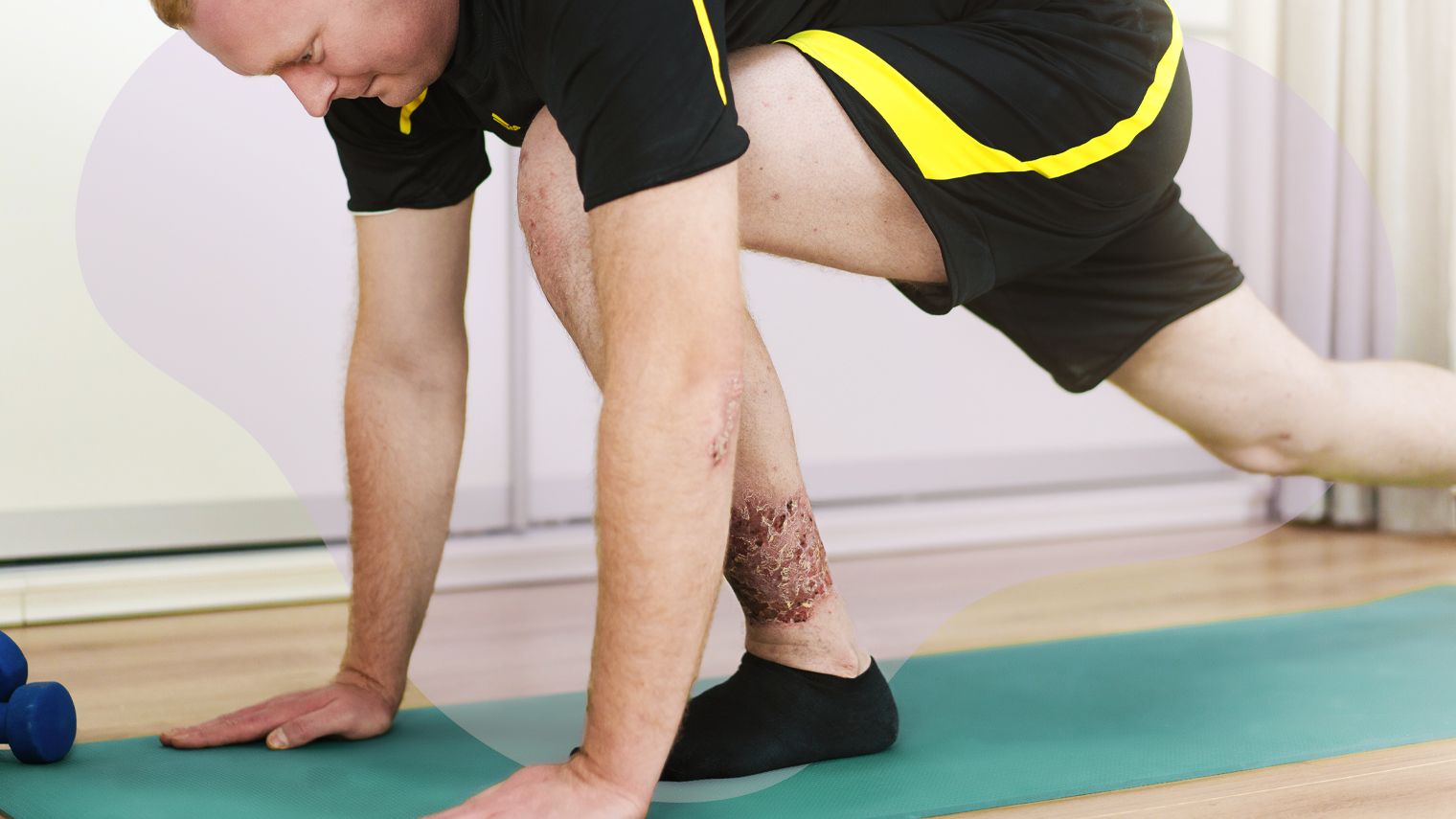Will My Psoriasis Turn into Psoriatic Arthritis?
December 26, 2023
Content created for the Bezzy community and sponsored by our partners. Learn More

Photography by Nina Kulagina/Getty Images
While these conditions are related, one does not always lead to the other. Read on to learn how they’re connected and some important differences.
Psoriasis (PsO) and psoriatic arthritis (PsA) are both autoimmune conditions.
PsO involves the skin, while PsA usually involves both the skin and the joints, causing skin changes with joint pain and stiffness. They commonly occur together, although not always.


Are PsO and PsA the same thing?
PsO and PsA are related, but they’re separate conditions.
Both conditions are autoimmune and inflammatory, and both usually require a specialist. A rheumatologist might be best for managing PsA, while a dermatologist is usually the go to for PsO.
Do both conditions experience flares?
Both PsO and PsA are long-term conditions that require ongoing treatment and the symptoms tend to wax and wane.
This waxing and waning is often referred to as flares. Sometimes, the flares are well-managed with treatment, but sometimes, they can be unpredictable.
A PsO flare presents with new or worsened skin plaques. A PsA flare may also involve new or worsened skin plaques but can include pain, stiffness, swelling, and heat in the affected joints, too. Some people with PsA also experience fatigue.
The flares are usually the most frustrating part of these diagnoses, as they’re hard to predict and can be difficult to manage.
I take a lot of naps to manage my PsA-related fatigue.
Sarah C, diagnosed with PsA in 2014
Does everyone with PsO have PsA?
No, not everyone with PsO has PsA. But PsO and PsA can be seen in the same person. Research shows that PsA is seen in about 20% of people living with PsO.
Also, not everyone with PsA has PsO, although this is a more common finding. Regardless, there still are cases of PsA without PsO.
Does the type of PsO I have determine if I‘ll get PsA?
The most common type is plaque PsO, which affects 80–90% of psoriasis cases. But the type of PsO doesn’t determine whether you will develop PsA.
If I have PsO, what are the risk factors for developing PsA?
Risk factors for developing PsA if you have PsO include:
- severe skin disease
- psoriatic nail disease
- obesity
- smoking
- alcohol
- triggers like stress, trauma, and infection
- family history of PsA
Can I prevent or predict if I will get PsO or PsA?
You can’t predict or prevent a PsO or PsA diagnosis. But a 2023 article reports that 68% of people living with both conditions experience PsO symptoms first and 15% experience symptoms at the same time.
The severity of your PsO doesn’t necessarily predict whether you will develop PsA.
Does immune system dysfunction cause both PsO and PsA?
An overactive immune system is seen in both conditions and is responsible for the primary symptoms.
In PsO, the inflammation causes the skin cells to turn over too quickly, causing thick, scaly, dry, itchy plaques visible on the skin.
In PsA, the inflammation results in joint pain. The primary site of inflammation is the enthesis, where the tendon, ligament, and joint capsule attach to the bone.
PsA may lead to permanent joint damage and may or may not also result in the visible skin plaques seen in PsO.
Both conditions may affect the eyes, causing uveitis, and the nails, making them appear thick, dry, cracked, and yellow.
What other health conditions am I prone to with PsO or PsA?
Some other comorbidities, or other medical diagnoses, share a link with PsO and PsA.
People with PsO, PsA, or both are at higher risk of a metabolic syndrome. This means that you might be at higher risk for type 2 diabetes, heart disease, high blood pressure, and obesity.
Are the treatments for PsO and PsA different?
Treatments for PsO and PsA manage symptoms and reduce the severity and frequency of flares. Some prescription treatments for these conditions are the same, but some are different and target each one separately.
Prescription treatments for PsO include:
- topical creams and ointments
- light therapy or phototherapy
- oral or injected medications such as biologics
Prescription treatments for PsA include:
- anti-inflammatory treatments, including nonsteroidal anti-inflammatories (NSAIDs) and steroids
- oral or injected medications such as biologics or disease-modifying antirheumatic drugs (DMARDs)
With prescription treatment, I have gone from 85% PsO coverage to around 15% coverage at worst, and no new joint problems since starting.
Tami S, diagnosed with PsO in 1996 and PsA in 2008
What lifestyle changes can help PsO and PsA?
Various lifestyle modifications can help you manage both PsO and PsA. These include:
- quitting smoking, if you smoke
- limiting alcohol, if applicable
- maintaining a moderate weight
- improving your sleep
- eating a balanced diet
- practicing regular physical activity
- reaching out to a psychologist
- keeping up on your screening and wellness exams
- seeing your specialist regularly
It’s important to note that sleep apnea (OSA) is linked to PsA, so the improvement of sleep may include considering whether you’re experiencing OSA, too.
The bottom line
PsO and PsA have a lot in common, but they’re different.
They’re both autoimmune conditions with symptoms that are due to inflammation and immune dysregulation.
Treatments are available for both, but people living with PsO and PsA may still experience flares of their symptoms.
Medically reviewed on December 26, 2023
5 Sources


Like the story? React, bookmark, or share below:
Have thoughts or suggestions about this article? Email us at article-feedback@bezzy.com.
About the author